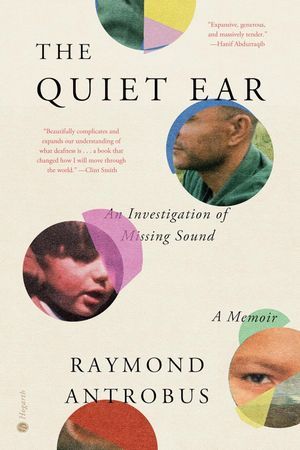This content contains affiliate links. When you buy through these links, we may earn an affiliate commission.
September is Deaf Awareness Month, a time when we celebrate the D/deaf and hard-of-hearing community. Raymond Antrobus is a poet known for his poems about everything from deafness to being part of the Jamaican diaspora. Now, he’s back, but this time, he’s written prose.

The Quiet Ear by Raymond Antrobus
Raymond Antrobus grew up as a biracial kid in East London. When he was six, doctors realized he was deaf. Antrobus couldn’t hear everyday sounds like whistling kettles, alarms, and some people’s voices. When he went to school, he hated having to wear his hearing aids. Often, adults and kids alike doubted he was deaf. “But you don’t look deaf,” they’d say.
Throughout his memoir, Antrobus describes how he existed at the intersection of biracial and deaf/hard-of-hearing. With a Jamaican father and English mother, Antrobus often felt like he wasn’t “enough” for either of his parents’ communities. Because he could still hear a little bit, people often didn’t think he was deaf enough to need any accommodations to live in a world built by, and for, the hearing. Without accommodations, Antrobus was left to muddle his way with lip reading and pretending he understood what people were saying.
Poetry came into Antrobus’s life at a time he felt adrift, lost in the world. He found himself using every spare moment to write in his notebook, trying to put language to his feelings. When he found other poets, he found a supportive community that encouraged him to keep going, to keep performing and sharing his art.
Antrobus performs the audiobook with a poet’s sense of rhythm and pacing. His narration has this ability to draw listeners in to hang on his every word. Several sections of his memoir discuss his struggles with speaking and experiences with speech therapy. Being able to listen to him perform his prose emphasizes how Antrobus has come into his own. Finding his voice as a poet has helped him find confidence in the way he speaks. His narration marks him as a man who is proud of who he is and how he moves through the world.
The Quiet Ear is a portrait of a deaf poet coming into his own. The prose is written with a poet’s unique understanding of language and winds its way through paragraphs and pages. Antrobus’s words create a deep impression of a young man coming of age and his acceptance of his own identities through his love of language.
Read This Book
One book recommendation to help you cut through the noise
You can find me over on my Substack Winchester Ave or over on Instagram @kdwinchester. As always, feel free to drop me a line at kendra.d.winchester@gmail.com. For even MORE bookish content, you can find my articles over on Book Riot.